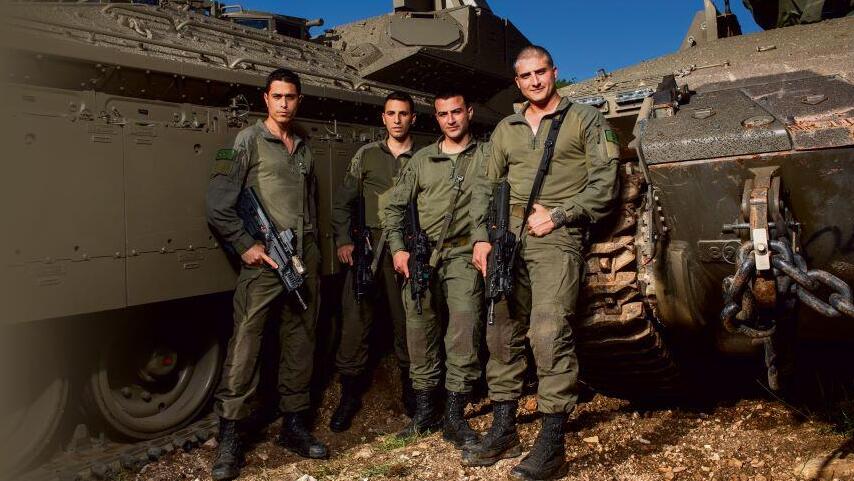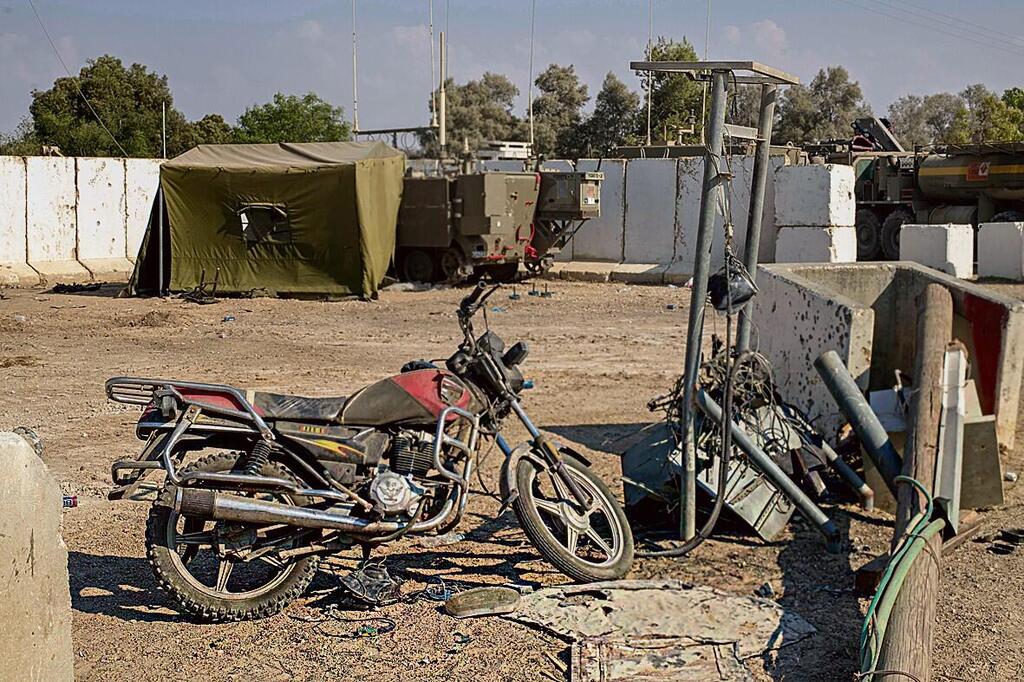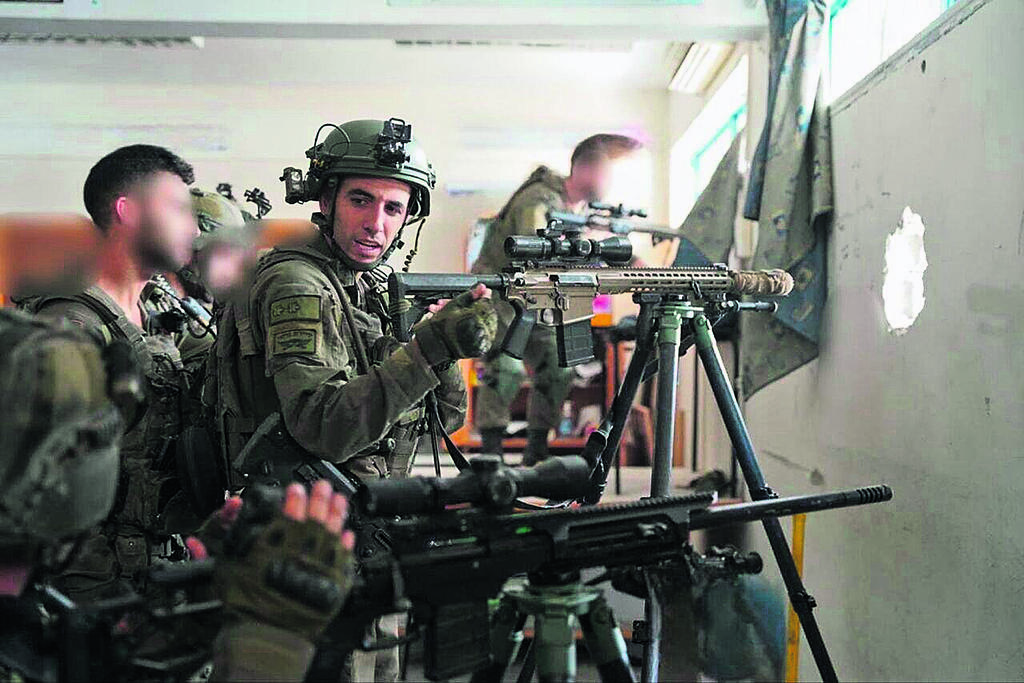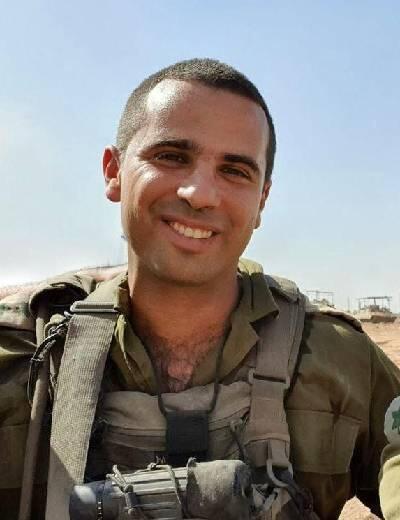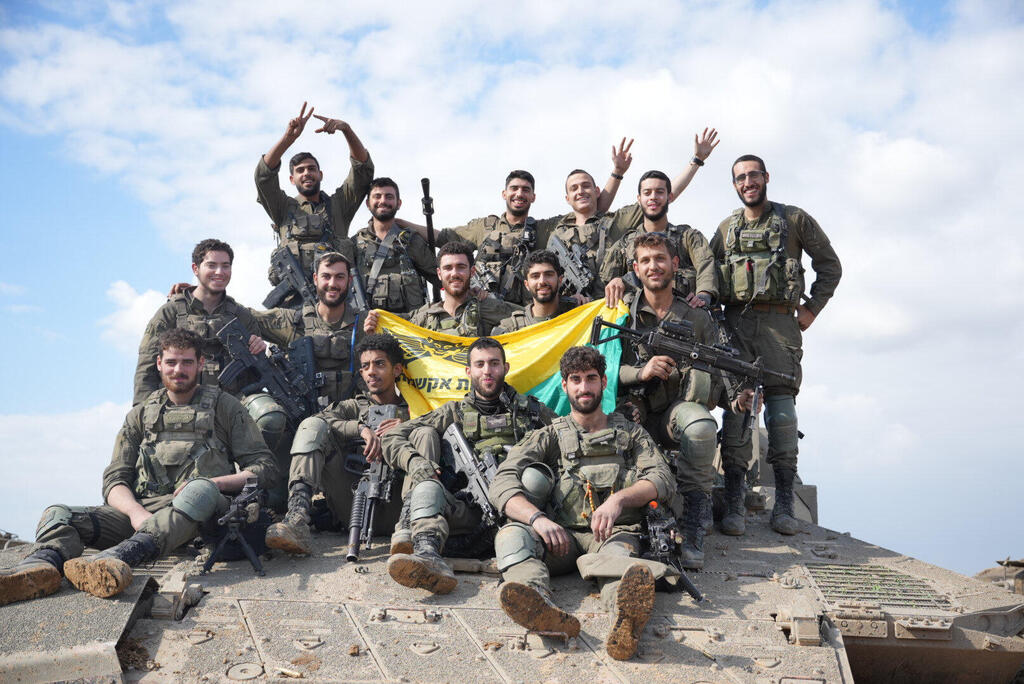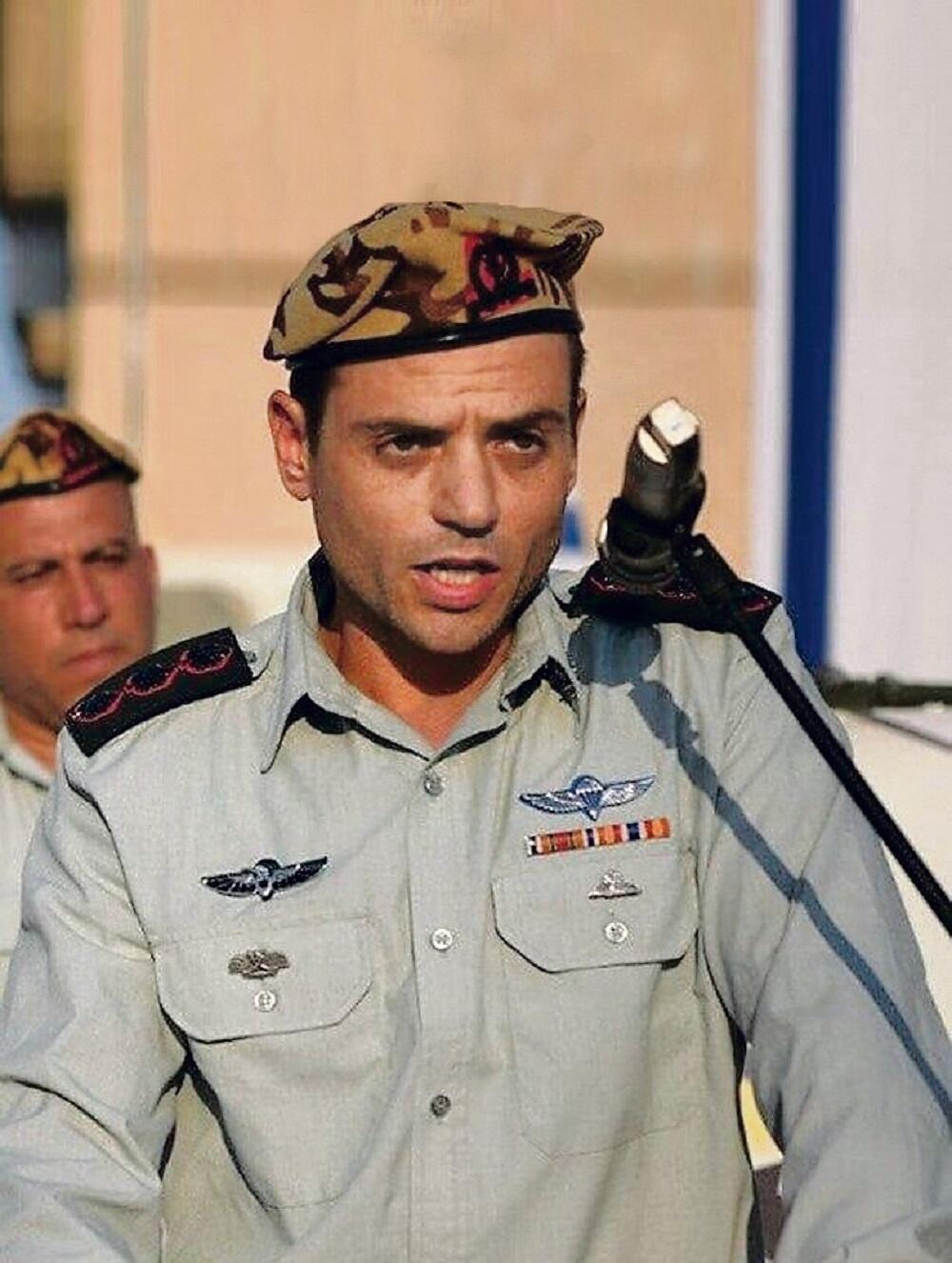Getting your Trinity Audio player ready...
On October 7, Golani Brigade suffered the heaviest blow of all IDF divisions, but even this did not break the fighting spirit of its combatants. After leaving Gaza, four Golani battalion commanders recount the battles they have witnessed ("We rushed forward and no one could stop us"), the preparations for a possible operation in the north ("There is no doubt, we are capable to conquer southern Lebanon"), and also about the fallen comrades in arms, including the former commander of the 13th Battalion, the late Lt. Col. Tomer Greenberg: "This is a punch in the stomach. A bomb. But we keep going, there's no other choice"
The Tour de France is considered to be the world's most difficult sporting race. It consists of three weeks of grueling cycling across France and its neighboring countries, pushing to the limit of pain. It is not surprising, then, that IDF generals and commanders borrowed the race's name to describe the mentally agonizing and tormenting journey they are undergoing, naming it the "Tour de Bereavement."
Alongside the defensive battles ongoing in the north of Israel, the battalion commanders of the Golani Brigade have been busy visiting, or at least talking to the bereaved families of the fallen soldiers of their battalions - those from past years and the new ones who were added this year, since that cursed Shabbat on October 7. Among the Golani brigade, the number of fallen is enormous. In the 13th Battalion alone, 44 soldiers have fallen since the outbreak of the war; In the 51st Battalion, 33 were killed.
Ahead of Israel's 76th Independence Day, after leading the ground maneuver in the Gaza Strip, we convened for a special interview the four battalion commanders of the Golani Brigade: Commander of Golani Reconnaissance Brigade (Sayeret Golani), Lt. Col. David Cohen (36); 51st Battalion Commander Lt. Col. Meir Ohayon (36); 12th Battalion Commander, Lt. Col. Omer Suleiman (36); and the commander of the 13th Battalion, Lt. Col. Tal Turgeman (31), who was brought in to replace the former commander, the late Tomer Greenberg, who fell in the battle in Shijaiyah.
We meet them at the northern border, where they have been settled since the brigade left the Gaza Strip. It's an educational-tourist facility that, due to the circumstances, was transformed into a military outpost. During the interview, a message is received: "A mortar bomb fell on a nearby army post. There are casualties." Lt. Col. Turgeman, who is in charge of this military area, sends medical and evacuation forces and goes there himself. When he returned, his face was grim. One of the fighters was killed in the mortar attack. The next day it was already allowed to announce: the dead is the Collection Unit fighter, Staff Sgt. Haim Sabach, (20), from Holon.
The four commanders talked about the difficult struggle on October 7, about the control and security they felt during the maneuver in the most dangerous places inside the Strip, about the fighters and friends they lost in the battles, and also about the enormous frustration they felt when they were ordered to leave Gaza. "The mission is not accomplished yet," says Lt. Col. Ohayon, 51st Battalion Commander. And the Sayeret Commander, Lt. Col. Cohen, emphasizes the reason: "There are still hostages."
Lt. Col. Ohayon, married and the father of three, was raised in Beit She'an and currently lives in Kfar Saba. He began his military service as a fighter in the 51st Battalion, and two years ago he came full circle when he returned as its commander. In-between he served as a commander in Egoz, commander of the Sayeret school, and operations officer. Gaza left him with scars already in 2014, during Operation Protective Edge (Mivtsa Tzuk Eitan). Ohayon served as a company commander in Egoz and was one of the 14 soldiers who were wounded in the battle at Shijaiyah, in which two of the unit's soldiers, the late Staff Sergeant Tal Yifrach and the late Staff Sergeant Yuval Dagan, fell. "It was the most significant combat I have ever witnessed up to this war," he says.
On Saturday, October 7, two of the brigade's battalions were on duty in the South. The 51st Battalion held the Kissufim sector, and the 13th Battalion was in the Nahal Oz sector. The Sayeret fighters held the Jenin line, while the 12th Battalion was in the Benjamin area.
"The battalion was on normal alert," Lt. Col. Ohayon recalls. "About half of the people went home for the holiday, and there were five more tanks under us with a company commander and mortars. My father-in-law died the day before and my wife was nine months pregnant, so I was also at home and my deputy replaced me. At 6:37 a.m. I received a message from the commander of the supporting force at the 'Mars' outpost: 'There's a raid on the Kissufim axis, send out forces.' I immediately headed south. At 8.30 a.m., at Maon intersection I encountered the vehicle and the body of the late Lt. Col. Yehonatan Tzor, the commander of the Nahal Reconnaissance Battalion, as well as the body of the late Col. Jonathan Steinberg, the commander of the Nahal Brigade.
The Kissufim sector consists of 15 settlements. "With the exception of Kibbutz Nir Oz, forces of one kind or another reached all of them," Lt. Col. Ohayon says painfully. "There were dozens of events, complex battles. Soldiers and squad commanders who conducted combat and made decisions at the level of senior officers, who understood that the first thing they should do was go to safeguard the kibbutzim. They did an amazing job, I witnessed the fighting spirit and responsibility there, they were fighting like lions. Captain Ori Shani, a platoon commander in the battalion, together with six other fighters, conducted a six-kilometer withdrawal battle, while setting ambushes and killing dozens of terrorists. When he went back to the bunker intending to replenish ammunition, he was killed by a mortar bomb.
Sergeant Tomer Nagar, insisted on staying at his post with his Negev machine gun; he was eventually killed when his ammunition ran out. Major Raz Peretz, commander of the headquarters, provided cover for his soldiers who were inside a portable protective space, and eliminated three terrorists until he was killed. There were many stories of heroism. Out of the Kissufim camp alone we removed 21 bodies of terrorists, and Egoz removed another eight. The Kissufim sector was a fierce fighting stronghold. By the evening, we had stabilized the situation in the sector, and 50 hours later I announced: 'We have completed the containment phase.' There were 13 infiltration points in the sector. In the following two nights, as part of the clearing of the area, we killed additional 15 terrorists."
How do you explain the difficult outcome?
Ohayon: "In the first hours they managed to 'kind of win', thanks to several factors: the surprise element, the enormous mass of terrorists that invaded Israel, the parallelism of so many infiltration points hit simultaneously, and the high-quality battle procedure they carried out - they closed the axes that allow arrival of reserves, and they 'blinded' us by neutralizing observation towers. Our ability to stabilize the sector that evening was due to the level of competence and readiness of the battalion: each company did two or three company training exercises, the fighters were well acquainted with the area. The late Col. Asaf Hamami, the commander of the Gaza Division’s Southern Brigade, who was killed in the battle with two other soldiers - Sgt. Tomas Achims and Sgt. Kirill Brodsky, did a battalion exercise for us only a month earlier. During the 24-hours exercise he drove me crazy, going from one scenario to the other. He never missed a thing. But the worst scenario we trained for involved two raids at the same time; here we had 13."
If you had the same order of battle but with an advance warning, would you have acted better?
Ohayon sighs. "With the wisdom of hindsight, if I had one hour's warning, only one hour, everything would have looked different, both in terms of our point of view and in terms of the sector, the kibbutzim. The surprise element was so major here. With an hour's warning, I would have already placed the security alert squads in the settlements, closed all the arrival axes, all the fighters were already outside and properly equipped. That's all I needed to prepare. One hour. If I had just one hour."
If I wanted to meet someone here, it would be you
Lt. Col. Cohen (36), Commander of Golani Reconnaissance Brigade (Sayeret Golani), was raised in Migdal Ha'Emek and currently lives in Acre. He is married and the father of three. One of his children, five months old, was born during the war. "He hardly knows me," laughs Cohen, "he thinks I am his uncle."
He knows the Golani Brigade by heart. He grew up as a fighter in Egoz, served as a company commander in the 51st Battalion, deputy battalion commander in the 13th, and a regiment commander in Bislach (School for Infantry Corps), before he was assigned commander of the Sayeret, which is considered one of IDF's elite units.
On October 7, the Sayeret held the Jenin line. "There was a company stationed in Jalamah, a company in Mevo Dotan and a company in Avnei Hefetz. An hour's drive from one location to the other," he describes. "At 7.00 a.m. I received a call from our operations officer, saying that all forces were called to report immediately to the unit. There was no updated information. No one in the south responded. I summoned fighters from the Infantry school who were in their last week of training. I sent two teams to the south along with the commander of the school and another company commander. At the same time, I called in four helicopters to take us south, other commanders headed there with their vehicles. In the meantime, in the sector, I summoned the civilian security alert squads, until the arrival of the reservists.
Our first force arrived in the south at 11:45 a.m. But for Meir's (Ohayon) battalion, which has been fighting there since the morning, it felt like a lifetime. The helicopter landed us near Moshav Yated, and the first person I encountered there was Efraim Tehila who was driving an ambulance he had fetched there. I once served as Tehila's deputy in Egoz. I told him: 'If there was anyone I'd rather meet here, it would be you."
Lt. Col. Tehila, a decorated and particularly courageous fighter, was the former head of IDF elite Egoz commando unit and was discharged by the former IDF Chief of Staff, Aviv Kohavi, after two serious misconducts: in the first, he was overseeing the Egoz unit when a friendly fire incident led to the deaths of two Egoz officers - Maj. Itamar Elharar and Maj. Ofek Aharon. In the second case, Tehila was revealed lying in a military investigation about the soldiers' use of an explosive device during a training session which led to a fire.
Lt. Col. M. was appointed as the commander of Egoz in Tehila's place. In the first hours of the battle in Kibbutz Kissufim, M. was wounded, and Tehila, who went independently to the south, replaced him in the position during the war and was later commended by his commanders.
Lt. Col. Cohen and his troops of Sayeret Golani arrived at the gate of Kibbutz Holit, and already at the entrance they encountered the terrorists of the Nukhba unit of Hamas. "We surrounded the gate, entered through the fence, teamed up with tank women from the Caracal Battalion who came with a tank, and together we eliminated the terrorists," he says. "We searched the kibbutz and evacuated the wounded, and at the same time our forces arrived and engaged in battles in other places in the sector.
A force from our infantry school killed terrorists in the Be'eri forest. One of our fighters, Sergeant Roi Guri Z"l from Ofakim, went out of the house and fought against the terrorists, until he was killed. Before October 7, we would fight a little, at times we would be under fire, we would go out for military activities at night, but what we encountered that day in the south was nothing like anything. A decade ago, the Sayeret Golani did not operate in the north nor in Gaza, only in Jenin. Now it should serve as a lesson to all of us."
Lt. Col. Suleiman, Commander of the 12th Battalion, who celebrated his 36th birthday recently, began his career as a fighter in Egoz. He was raised in Ramat Yishai, and recently moved with his wife and their little son, Yuval, to Rehovot. Later on in his career, he served as a company commander in the 13th battalion, the Sayeret deputy battalion commander, head of a branch at the Urban Warfare Training Centre in Ze'elim, and over a year ago he took command of the 12th battalion. "On October 7, I was at the base," he recalled. "We held the Benjamin sector. At 6:30 a.m. I just finished assessing the situation when the barrages to the south began. When I took in the amount of the barrages, I realized that this was something different, unusual. At that moment, on my own accord, I said to my company commanders who were sitting with me at the end of the situation assessment, 'Forget everything we talked about, it's a war now.' Simply as that. When I realized that infiltrations were involved, I called in the forces positioned at our sector's settlements – Eli, Shilo, Beit El. I was sure that in a moment the terrorists would get there too. I dispatched to the south a platoon from each company, together with Hummers, equipped with grenades, Mags and ammunition. At the same time, we were still trying to understand what was happening there, where we should go, where we were needed. Palai (Brigadier General Yair Palai, who then served as Golani's Brigadier commander) also tried to figure things out. But at the level of the division and the brigade there, there was no one to talk to."
"There was no command and control there," comments Ohayon, who was already fighting in the field during those hours.
"I called for troops to come to our base, to prepare all the tools for war," Suleiman continues. "At the same time, our fighters arrived in Ashkelon, in Sderot. At 5 p.m. they arrived in Nir Am and encountered a group of terrorists."
Lt. Col. Turgeman, the new commander of the 13th battalion, did start in the brigade, but on October 7 he served as a regiment commander in Bislah (School of Infantry). He is married and the father of two. He grew up in Kiryat Ata and currently lives in Kiryat Motzkin. "Two days earlier, on Thursday, we finished a course of squad commanders," he says. "When my deputy battalion commander called me at 7:15 a.m., I thought that maybe our base had been broken into, or that some soldier had shot into the air. He told me: 'Turn on the news, hear what's happening.' I dispatched the whole battalion to the south. David's team, from the Sayeret, was at my course. It wasn't until we got outside Moshav Yesha, and I saw dead terrorists and Israeli civilians on the floor, that I realized what was happening. We were there with four jeeps, no grenades, no machine guns, no LAW missiles - just personal weapons. We were called for Kibbutz Sufa, there were four women tank operators who did an amazing job. We evacuated the besieged residents; we had skirmishes in the area. We stayed there for three or four days to defend the kibbutz, then I joined the 188th Armored Brigade, and conducted all the ground maneuver with them."
"The terrorists mostly fled"
They are close friends, all four of them. Throughout their 17-18 years of military service, their paths crossed more than once, in positions in the battalion, in courses, in operations in the field. The late Lt. Col. Greenberg, and the late Lt. Col. Salman Habaka, a regiment commander of the 188th Armored Brigade, who was killed during the IDF ground operation, were also their friends. A close friendship which was marked by fire and blood. After the harsh blow on October 7, they waited anxiously for the ground operation.
"A day before the ground maneuver, we went on a preliminary operation," says Lt. Col. Suleiman. "It was the first raid in which my battalion operated with the 7th Armored Brigade. We entered Juhor ad-Dik. We were there for 14 hours. When we went back to the assembly area, I convened the company commanders. One of the fighters, who operated a Mag machine gun, handled the stoppage. He unloaded the mag, and then a bullet was fired right into my left calf. The bullet went in and out ".
Fortunately for Lt. Col. Suleiman, the bullet didn't break the bone or tear ligaments and tendons, but it was enough for him to understand immediately that he would not engage in the maneuver the next day with his soldiers. "I grabbed my head," he recalled. "Not from the pain, but rather from the heartbreak. I can't explain how disappointed I was. Without sounding too irrational, I was thinking 'it's a shame it didn't hit my head'. That was the vibe. I was that close to Gaza, I was already inside, and feeling so emotionally charged due to everything that happened on October 7, and knowing that everything was ready for the maneuver. It's a huge frustration."
Suleiman was taken to Soroka Hospital in Be'er Sheva. Dr. Dan Schwarzfuchs, Deputy Director of the hospital's Emergency Department, who was chosen to light Independence Day torch, was among those treating him. "His son," smiles Suleiman, "was my soldier in Egoz."
Lt. Col. Shahar Barkai, the commander of the Golani Brigade's training base, who in the past served as commander of Golani’s 12th Battalion, regained his previous position to substitute for Suleiman. "I thought I would be back in two weeks," Suleiman recalled. "But the doctors kept telling me 'Wait, wait'. After three weeks I went for a medical examination and I was sure that they would allow me to return, but it turned out that I needed another operation, because there was an infection and a blood clot."
In the ceasefire that was made in favor of the hostage deal, the 12th Battalion went out to refresh, and Lt. Col. Suleiman went there to visit his soldiers. "I told them: 'When your soldiers fight and you are far from them and the battalion, it's the worst feeling a commander can have. But it's also a great pride to know that even when you are not there, the battalion operates like a machine'."
In December, about a month and a half since the start of the ground operation, Lt. Col. Barkai was moderately wounded in an encounter in Khan Younis. Suleiman did not hesitate. Although the wound in his leg had not yet healed, he hurried back to lead his fighters. "I took a pack of bandages with me," he describes. "We would go on an attack, and when we came back, I would disinfect the wound with wipes and water and change the bandage. After two weeks in Gaza, the wound was finally healed."
About three weeks ago, in an interview with the newspaper "Yedioth Ahronoth", Brigadier General Dado Bar Kalifa, commander of the 36th Division, which also includes the Golani Brigade, explained that the Southern Command had no plans at all for an extensive operation in the Gaza Strip, therefore it took two weeks until the maneuver began. "There was a plan on a small and irrelevant scale," he said at the time. "Shifa? The anchorage? Nuseirat? No one planned we would get there. So, we presented plans, trainings, exercises, organized armaments, prepared combat teams."
In the ground maneuver, did you feel you were ready?
"It's inconvenient to use that word," says Lt. Col. Ohayon, "but unlike October 7, the maneuver was good. You attack, you are in control as a military force. Three months of maneuvering was nothing like what we have suffered. After what we went through on October 7 - a few difficult hours, of almost defeat - the maneuver was a bright spot. it gave us strength. We opened the Netzarim Corridor. Golani led the division the entire time."
The Sayeret (Reconnaissance) and the 51st Battalion were tasked to take over Sheikh Ijlin, a neighborhood in the southwest of Gaza City, which is located in a particularly strategic place - on a hill above the Gaza coastal road. "We had to open the 'Coast Axis,'" describes Ohayon. "The maneuver was conducted according to the combat plan. We took control of Sheikh Ijlin. In the morning the terrorists attacked our company, and we killed dozens of them."
"It was a combined attack," describes the Sayeret commander, Cohen. "Suddenly they [terrorists] emerged from shafts right on the water's edge, car bombs arrived on the coastal road, and Nukhba militants from the Shuja'iyya Battalion came for their support from the neighborhood itself - five terrorists with RPGs. We eliminated them."
"We've been anticipating this," says Cohen, "and there it was – we were finally maneuvering. We were racing into Gaza - the air force, the navy, tanks - you're rushing forward, and no one can stop you. They were hanging their heads, hiding in the tunnels. We called it 'the bluff of the coastal axis'. The tunnels themselves were the most challenging, until the maneuver, we did not realize their magnitude."
"We went from one neighborhood to another and eliminated terrorists there," says Ohayon, "Sheikh Ijlin, Rimal, Zaytun, Shuja'iyya, and the central camps - Sheikh-Bureij and Al-Maghazi. There was a tremendous fighting spirit and we were constantly learning while fighting – taking control over high-rises, operating D9 bulldozers that we were not familiar with. But Shuja'iyya was a big challenge."
"The operation in terms of Shuja'iyya was planned to last 72 hours," Lt. Col. Cohen reveals, "we stayed there for 21 days. The Golani Brigade goes back a long way with Shuja'iyya. We used drones, snipers, ambushes, and killed the largest number of terrorists there. We managed to get to the enemy, infiltrate, see and eliminate the terrorists from short ranges."
Throughout the maneuver, Golani fighters learned to distinguish the difference between the operational methods of the various Hamas battalions. "The Sabra Battalion (one of the Gaza City Battalions) operates mainly from the underground," describes Lt. Col. Cohen. "The Zaytun Battalion is relatively persistent and operates in the form of raids, like special forces. The Shuja'iyya Battalion works in a 'combat areas' method. The constructions there are prepared in advance, with all the equipment, armaments, bombs, weapons, and only the operatives go through the tunnels from one building to another. They are waiting there, and everything is ready for use. In the al-Bureij battalion they mostly fled. Their abilities were relatively low. In general, in encounters with Hamas terrorists they mostly fled. They tried to manipulate us, like sending out women and children as observers, trying to find out where we were, and then fire an RPG and run away."
"Hamas and Hezbollah are based on guerillas," adds Ohayon. "Their plan is 'come in, feel comfortable, and then we'll knock you out.' On October 7, may their names be erased, they acted well. But then, in the maneuver, they fell apart. They either tried to hit only from long ranges, or they ran away."
Nevertheless, the public still has a feeling that we did not defeat them there. The great IDF cannot eliminate a terrorist organization?
Turgeman: "It is possible. But it's just a matter of time."
Ohayon: "In Mosul, it took the United States nine months to eliminate 5,000 ISIS terrorists."
"You get a punch in the stomach - a bomb, but you keep going, there's no other choice"
On December 12, the Golani Brigade again suffered a very heavy blow. One of the companies that entered a building in Shuja'iyya was caught in an exchange of fire, and the contact with the commander was cut off. In Golani, as in Golani, everyone rushed to help. "We were during a battle encircling the Kasbah," describes Lt. Col. Cohen. "Ohayon was the first to enter the heart of the neighborhood and I was supposed to follow him. When we heard about the company being hit, we all approached the compound. There I met Tomer (Lt. Col. Tomer Greenberg, commander of Golani Brigade's 13th Battalion) and Benba (the late Col. Yitzhak Ben Bassat, known as a legend in the Golani Brigade, who was in the middle of retiring from the IDF but decided to remain when the war broke serving as head of the Golani Brigade chief’s forward command team). We decided that Tomer would go to cover from one side of the building while we will go in. As soon as Tomer's force came out for cover, Tomer got hurt. This is a death alley. They were caught in an ambush between two squads that were waiting for them. It's a closed area, you can't enter it without getting hurt, it's impossible to get armored vehicles in there, the rescue lasted for many hours."
Nine fighters fell in that serious incident: Col. Ben Bassat; Lt. Col. Greenberg; Major Roi Meldasi (23), a company commander in the 13th Battalion; Major Moshe Avraham Bar-On (23), company commander in the 51st Battalion; Captain Liel Haiu (22), platoon commander in the 51st Battalion; Sergeant Eran Aloni (19), fighter in the 51st Battalion; Sergeant Achia Daskal (19), fighter in the 51st Battalion; Major Ben Sheli (26), commander of a platoon of soldiers in the 669 Special Rescue Unit; And Sergeant First Class Rom Hecht (20) of rescue Unit 669. May their memory be a blessing.
"It was a battle of heroism and friendship, in its most beautiful form," says Ohayon, who does not hide the pain. "So many commanders were killed there. I was already inside the Kasbah and heard everything in the communications. These are your friends, your subordinates, your people. It's a punch in the stomach. A bomb. But you must keep on going, there's no other choice."
Suleiman: "You have to understand how deep the connections are here. In Operation Protective Edge, David evacuated me when I was injured by grenade fragments. Benba stood by my side when I got married. Tomer was on my team for two years at the tactical command college. These are the closest friendships one could ever have."
"This spirit of the commanders at the front - that was the spirit throughout the war," adds Lt. Col. Cohen.
After the fall of the late Lt. Col. Greenberg, his predecessor in the position, Lt. Col. Yuval Mazuz, arrived and regained command of the 13th Battalion until the withdrawal from the Strip and his official transfer to Turgeman's command.
How do you begin to command a battalion that has suffered such blows?
Turgeman: "During the incident, I was on the other side of Shijayiah. A day later, when they started talking to me about taking command, the feelings were mixed; to replace a regiment commander like Tomer who was killed, in a battalion that took heavy casualties on October 7. Everyone told me 'Come, restore the battalion'. When I arrived and met the commanders and the fighters in the battalion, I realized that apart from the bereaved families, there was no one who needed morale boost. The strengths there were enormous even before I got there, thanks to Tomer. This is a battalion that, after all it had suffered on October 7, turned the tables, and went to war. When I saw the amount of mental strength there, I knew the pep talk I was about to give was not necessary."
Cohen: "Tomer was evacuated at 8 p.m., and at 4:00 a.m. Mazuz has already led the battalion to an attack."
When asked about the bright spots in this war as far as they are concerned, they all agreed on the capabilities of the commanders and the young fighters. "When combatants and commanders enter such a war without operational experience, it's complex," says Ohayon. "As a commander, I'm always worried - am I preparing them well enough for the mission? And in this maneuver, I realized that they were up to the task, in all respects. In this entire maneuver, there was not a single soldier, let alone a commander, who came up to me asking when it would be finished ".
Suleiman: "There is no point in Gaza we wanted to reach, that we didn't reach. All commanders follow the orders. There is no such thing as 'No'. On the other hand, they ask questions and have professional doubt on everything."
Ohayon: "They challenge you and raise professional questions. And this is very important."
Cohen: "We also pass on these questions to the division commander and the major general. This is how we learn. From the bottom up. The comments come from the field."
Lt. Col. Cohen is also satisfied with the destruction that remains in the Gaza Strip. In the first half a mile in Shuja'iyya there is nothing left. But this is still not the case in the entire strip. There are places where we could have acted more strongly. And of course, there are still hostages."
"When they told us to leave, it frustrated us," Ohayon explains, "We understand the importance of what we are doing and what still needs to be done in the north, but we have not yet completed the mission in the Strip."
Turgeman: "As a regiment commander, I was glad to see all the strengths of the army. I also think that this war will entail a huge change in the army, which until now has mainly invested in intelligence and the air force, namely, put money on bombs, rather than military shoes. The maneuver proved itself. The sense of capability is also huge. When talking about taking over southern Lebanon, there is no longer doubt about our capablity to do it. You just say the word, and we do it."
Cohen and Ohayon say they share Turgeman's feeling. "Especially in this period, after the Holocaust Remembrance Day," Ohayon says, "when someone says he intends to destroy you, you should take him seriously. I don't know if [an attack on] Hezbollah will happen now or in two years, but it will happen. We have been preparing for three months. Hezbollah will not threaten the existence of Israel in the north. This will never happen. We have a whole region of evacuated Israelis who have been made refugees in their own country. This is crazy. "
Cohen: "After the Holocaust, we said, 'never again,' and on October 7 this happened again. People were slaughtered. Women were raped. October 7 left me with a strong sense of failure. We were not activated in the right places. If I had known what was happening in Be'eri... we could have acted much better if we had an updated information. But this will never happen again. I can feel how my soldiers are anxious to fight here in the north. They are anticipating, ready with their weapons."
Turgeman: "You have to go into the settlements of Yir'on or Avivim to understand the meaning of a 'ghost settlement'. I had a conversation yesterday with my company, and one of the soldiers asked me, 'When can the evacuees return home?"
And as for those on the other side of the border, do they also keep a safety distance?
Turgeman: "They also have an internal security zone. They are not here. They fled north. Maroun al-Ras is also evacuated now. There is no longer an Iranian boardwalk. For every movement they make – there's an attack. They moved more than 3 miles away. All the villages close to the border are evacuated."
And now we've just celebrated Israel's Independence Day," Ohayon says. "Those who were there on October 7, fighting and witnessing the sights, understand: this threat must end. We can't go on otherwise. The fighters understand, the army understands, but we engage in tactics and are not decision makers. One way or another - this must be resolved."



